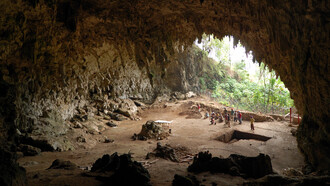"The Opera in Black" is a piece I created on November 8th for the 2023 Mosaic Biennale. I haven't written about it yet, and yet perhaps it's the most accomplished and defined event compared to the exploratory actions of the past two years. Certainly, it hasn't encountered any stumbling blocks caused by rain and my fears, as in "The River and the Snail."
The location is always Parco della Pace, the outdoor logos where solitude and that silence, which is not the absence of sound but the presence of the noise of the wind and leaves, are the companions of my thoughts. Sometimes I am surrounded by the noise of cars and voices coming from nearby streets, but in contemplation, I forget them. It is here that, when necessary, I stop and embrace pauses in my existence. In reality, for some time now, pauses have far outweighed actions. I sit and observe and think, "The Tree of Life still exists. In the two works already realized, girls and boys have lain on the ground; next time somehow, I will find a way, and I will have them climb the trees that surround the space." Then I take photographs. By now, there are hundreds. Always the same. And I am drawn to these trees that surround me and seem to rise beyond themselves. In the park, even in this season, they seem to have descended from the sky to make us happy.
Only the tree of life, on the ground, is in a state of abandonment. Looking at it now, with missing parts revealing what lies beneath, like grass and earth, and especially with the loss of color and faintly discernible images, I see my memory fading, just like those figures. And if I go beyond myself in thought, the Tree of Life is the exact image of our contemporaneity and how, like us, it is falling apart. I rise from the bench and once again begin my journey inside it, and always, with amazement, I recognize myself. I recognize myself in its wounds—in the fire, in the water, in the fish, in the figures—even the monstrous ones, that occupy narrow spaces wedged between branches. I recognize my mistakes. In this sense, I can say that in the Opera in Black, I celebrated my own mourning and its mourning.
A few days ago, Riccardo sent me the video of the actions, and so I felt the desire to return, to rewrite what may seem like an obsession. Instead, it's just a response and once again the acknowledgment of the work of many friends, not forgetting that events are born, live, and die in the realization of actions at that particular time. The fatal circumstance that determines actions is the body when it assumes a state of freedom, a sort of consent, and courage towards itself. The video recordings are something else, they are the more or less successful memory of a work that has passed.
I, too, at this moment, through writing, am engaging in an operation of memory. In reality, the phrase "the splendor of innocence darkened and the eyes became blind" (Hildegard of Bingen, 1098–1178) does not only concern the Opera in Black, but it contains the essence of the actions that I have carried out in the open since 2012 in sacred conversations with nature. There is always a before where bodies exalt their balance with the metamorphoses of events and an after where the harmonious relationship with the earth, our home, is annulled.
I remember the morning of November 8; it's a beautiful day, and it definitely won't rain. The first to arrive are the children of the white voice choir, Notes from the Mordani School, directed by Maestra Catia Gori; I observe their astonishment at this vast open space. We let them run in the park while waiting for the event. The choir will accompany the actions carried out by Sofia Bolognesi, Valentina Mariani, Andrea Pieri, and Riccardo Poletti, directed by Monica Marcucci. Sara Maioli and Riccardo Galeati, the wandering artists, are also getting ready, engaged here in video recordings and photographic documentation.
There. The actions begin with a prologue: Andrea and Riccardo move towards the two figures embracing in the tree of life, and they overlap with them. Then it's Sofia's turn to take the position of all of us in the maternal womb, and finally Valentina also appropriates a figure without color anymore and, like the other three, with their bodies, brings to life a mosaic that is on the brink of extinction. Always accompanied by the choir, they rise and reclaim the golden age with play. Play as an action that reaches its peak and simultaneously transitions from the age of innocence in "round and round the world falls, falls the earth, everyone's already fallen" to the funeral rite. And finally, in black earth, with blindfolds on their eyes, the performers follow the Pied Piper, invincible, defeated by nature.















